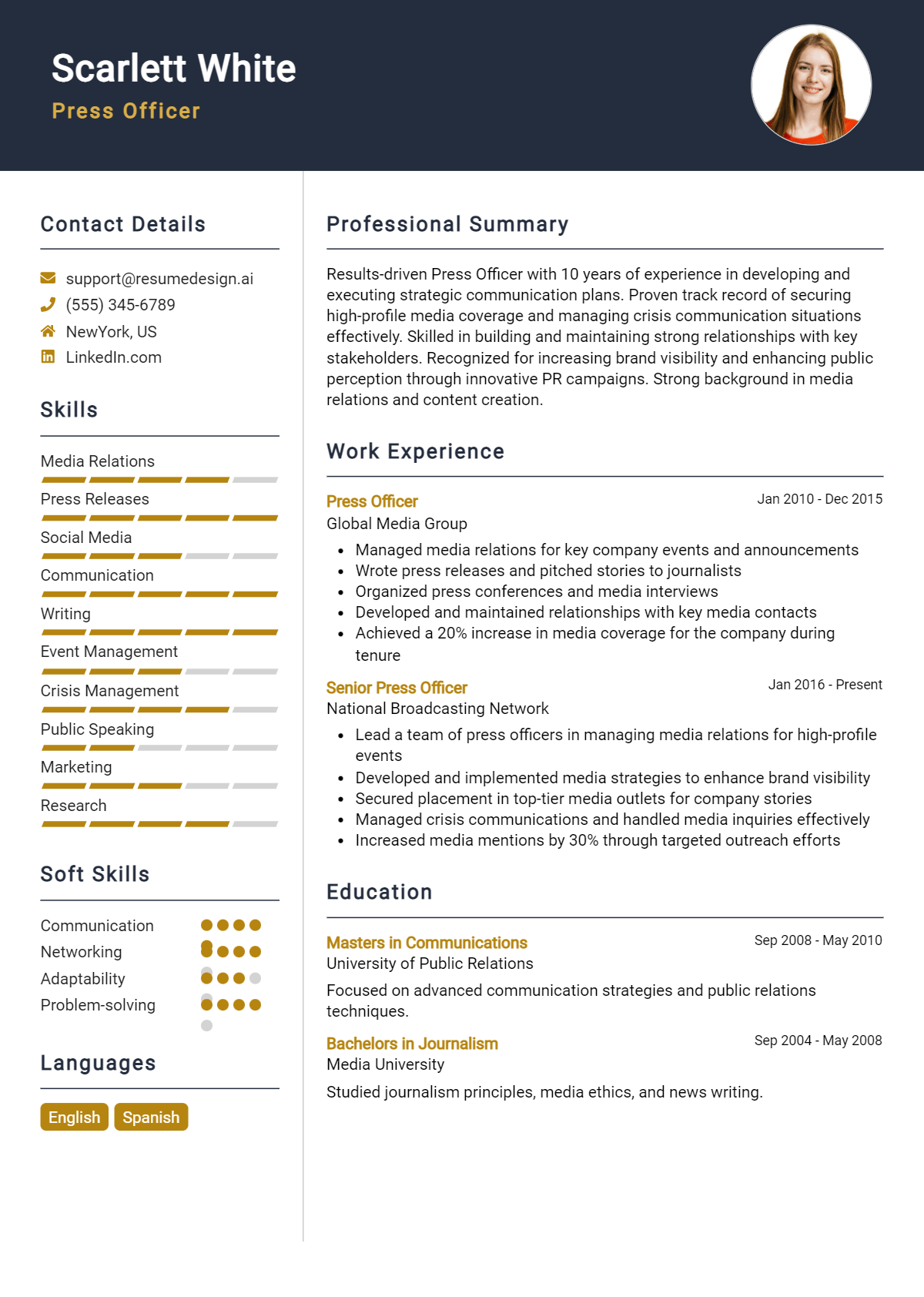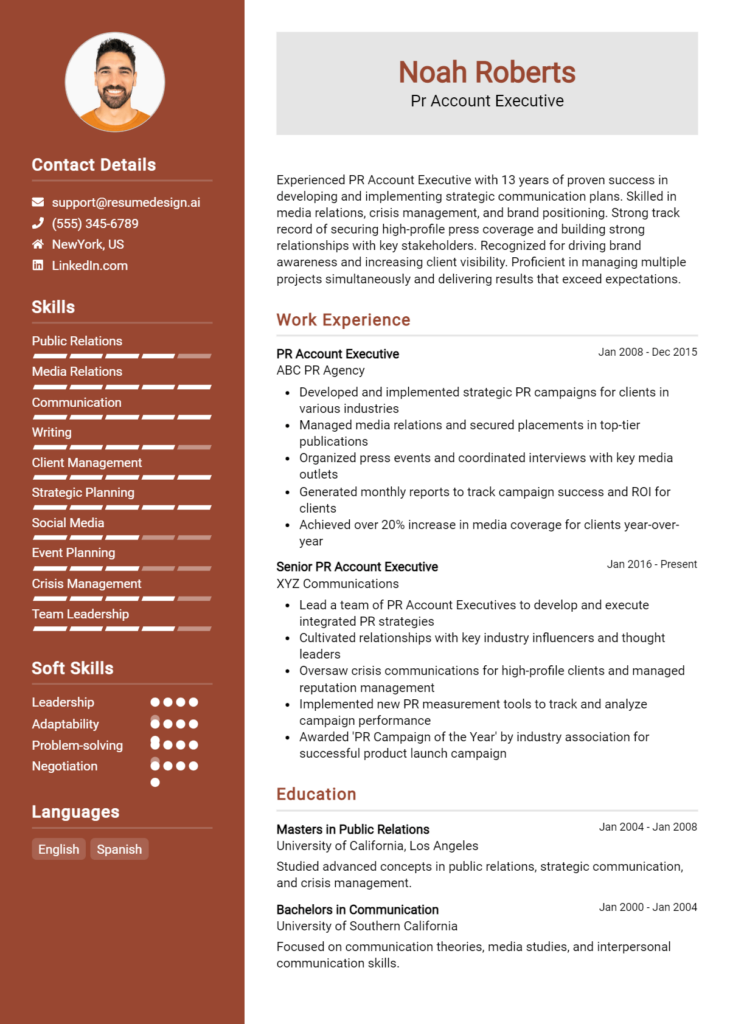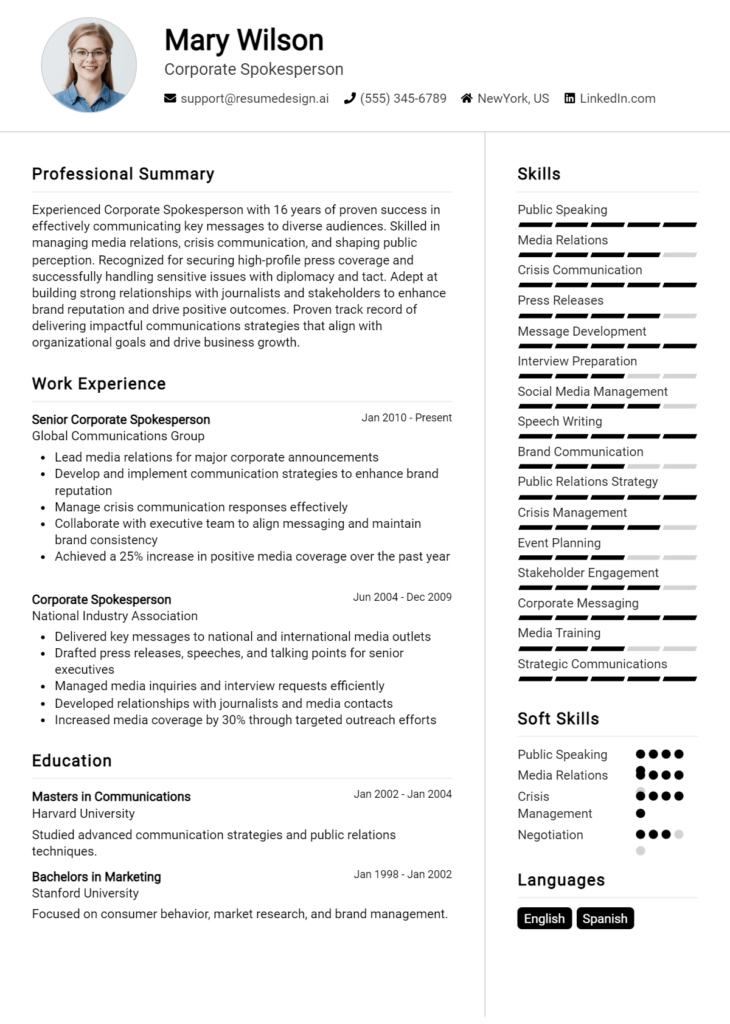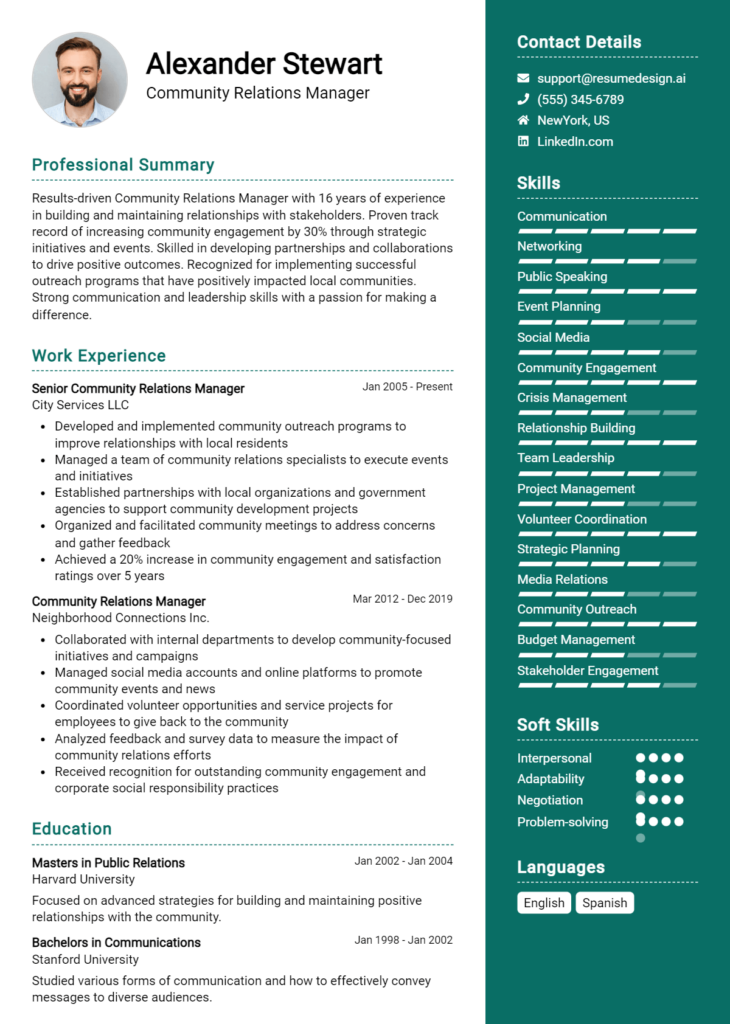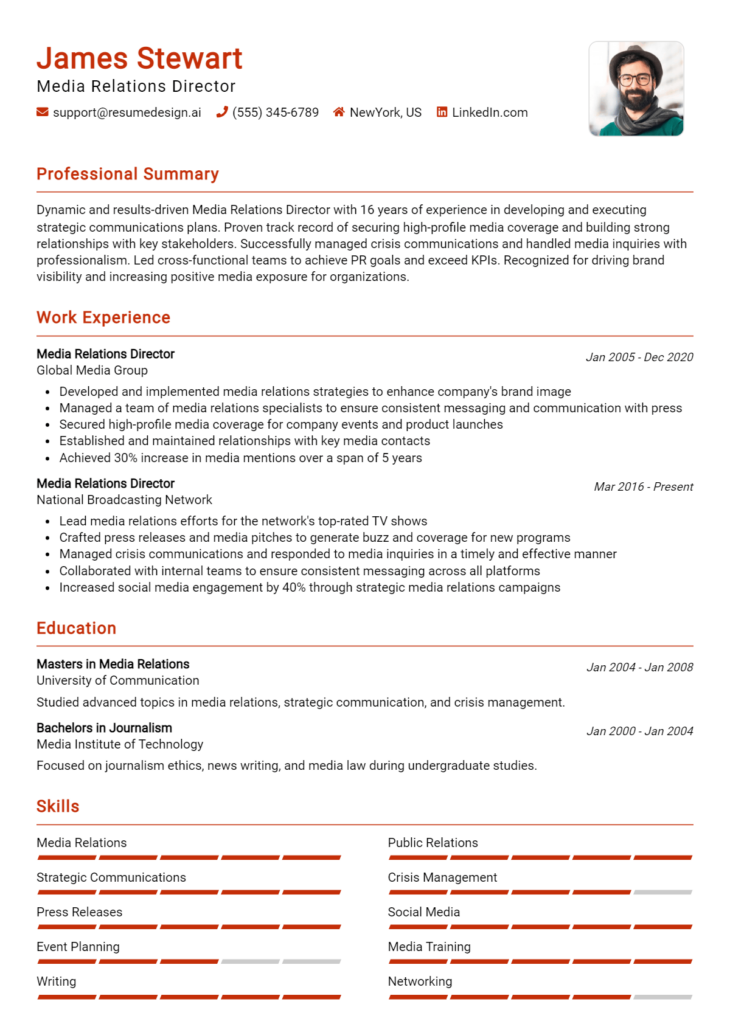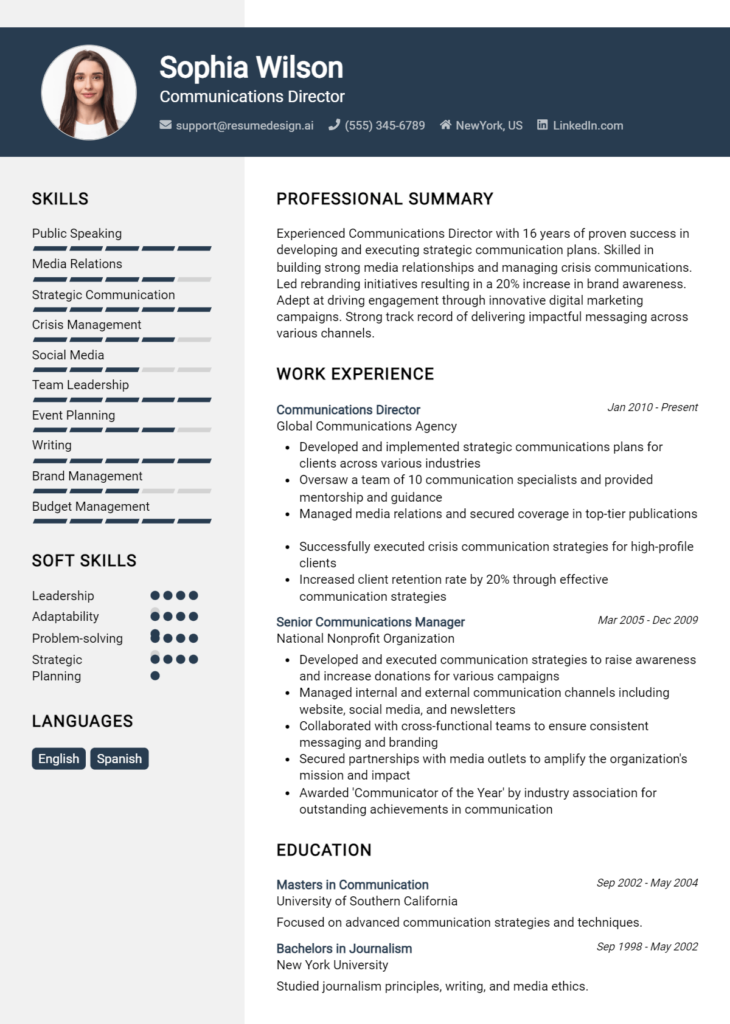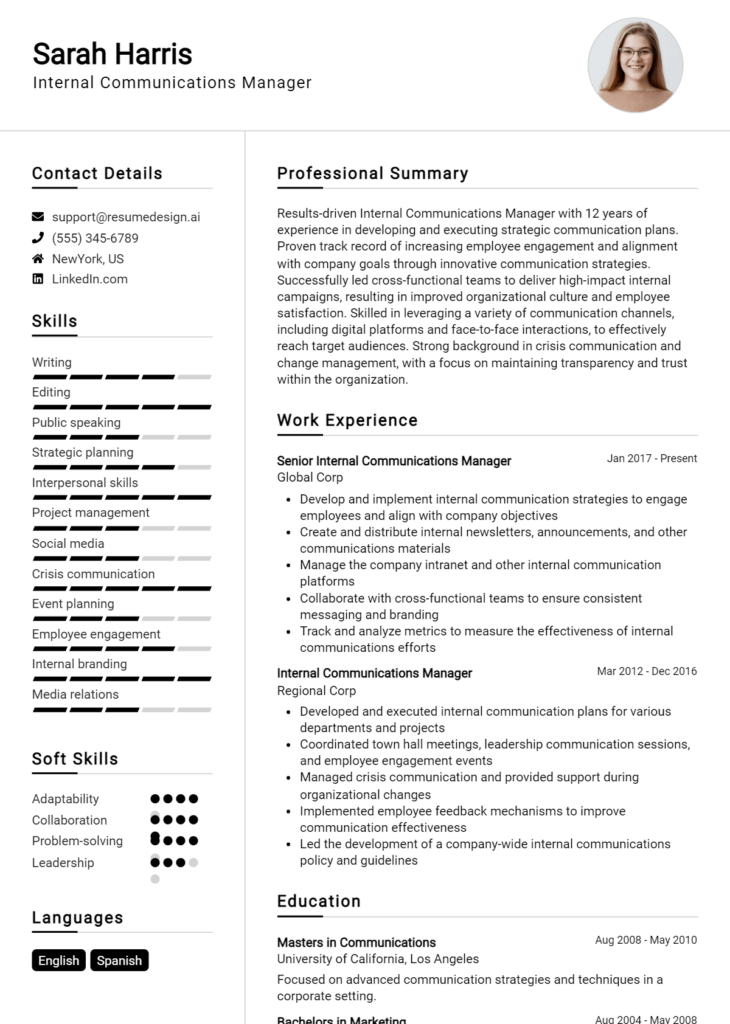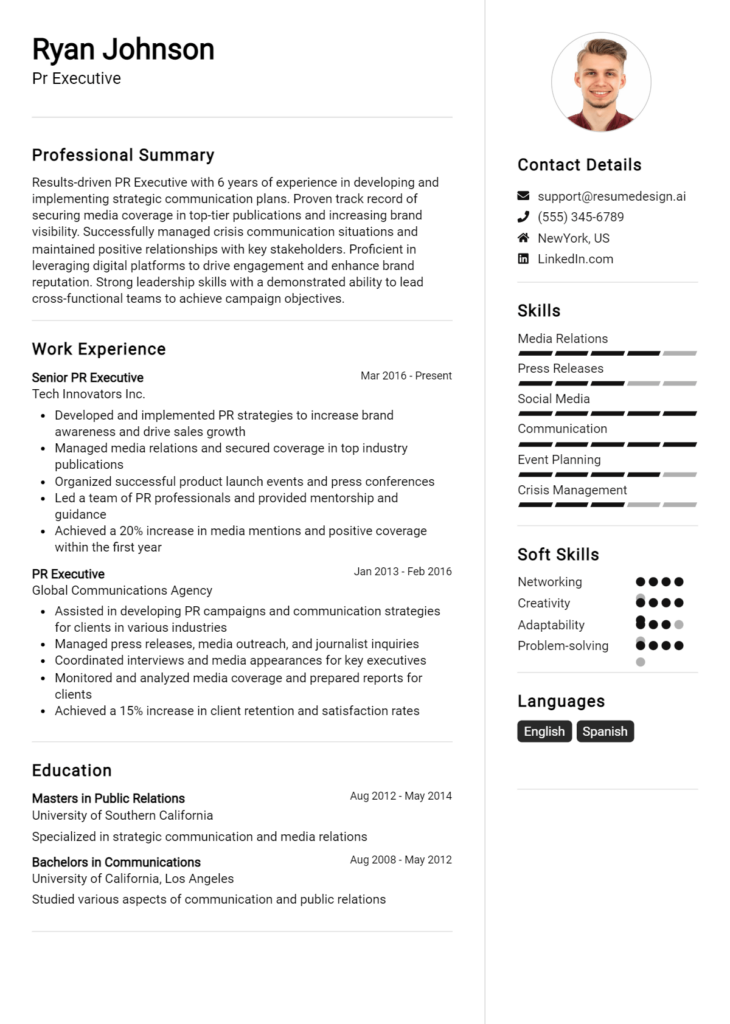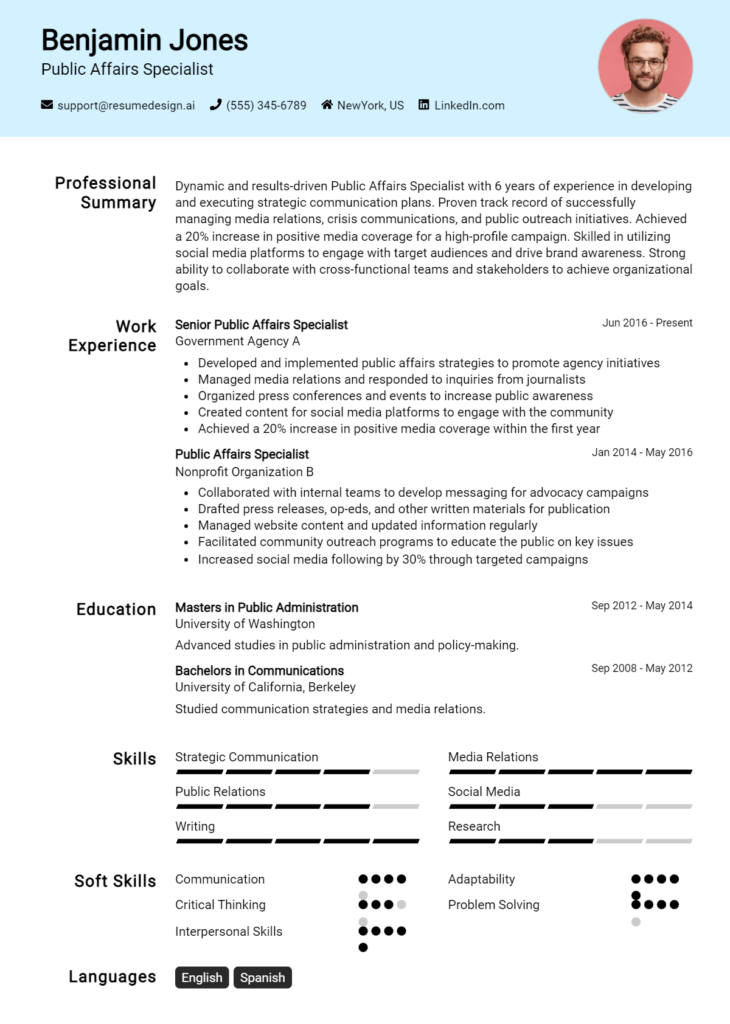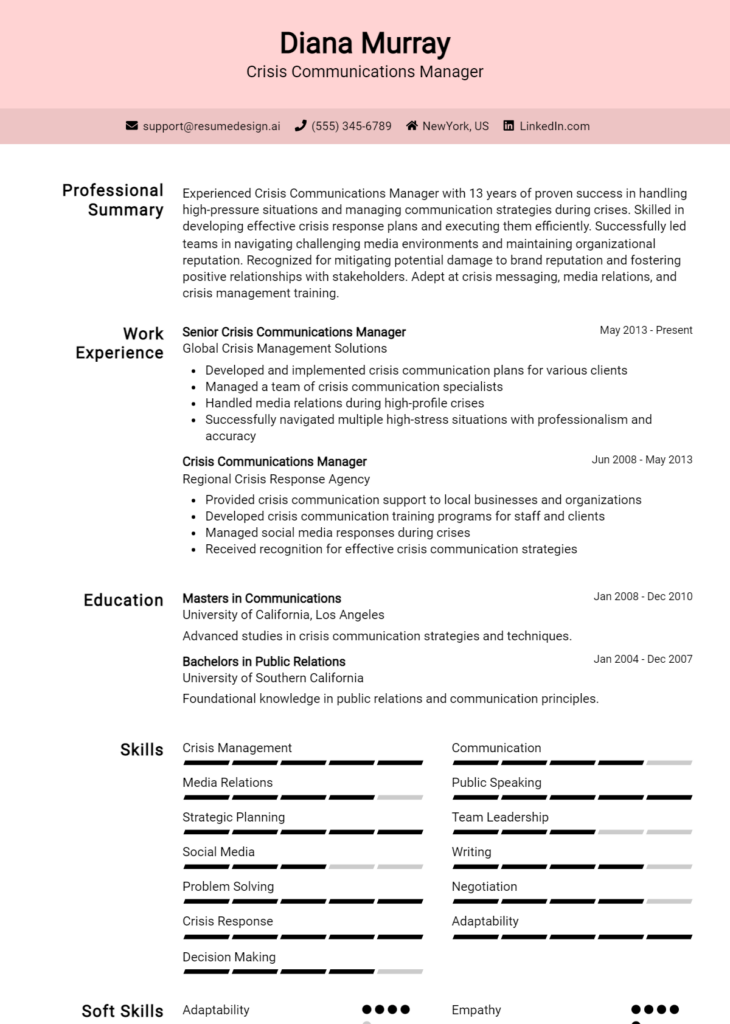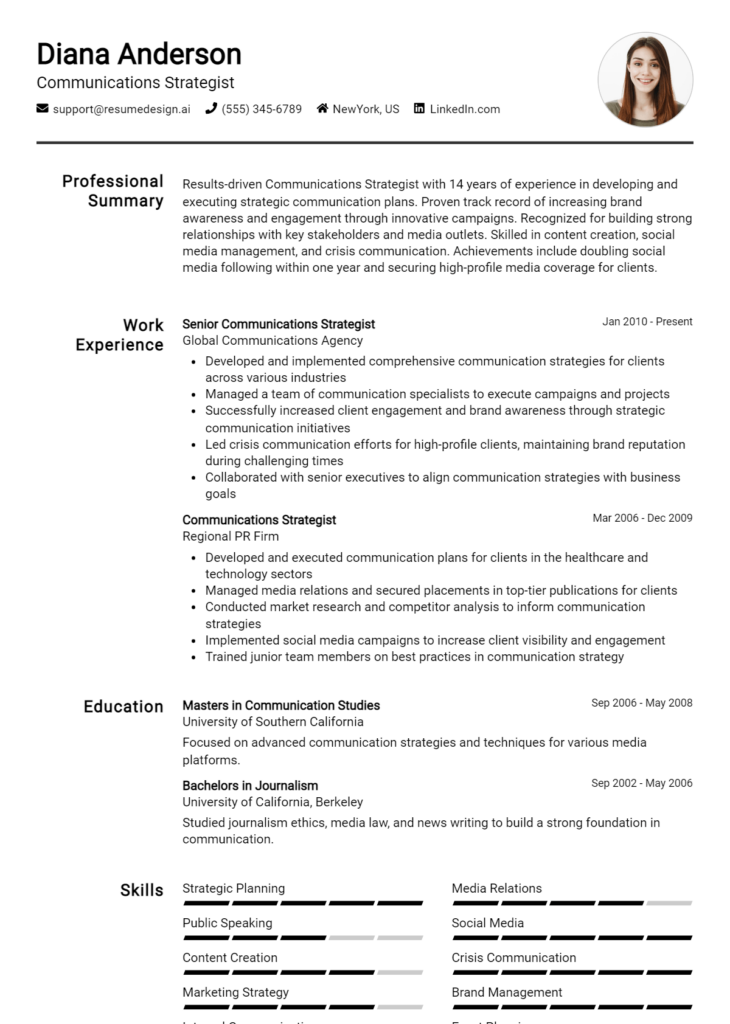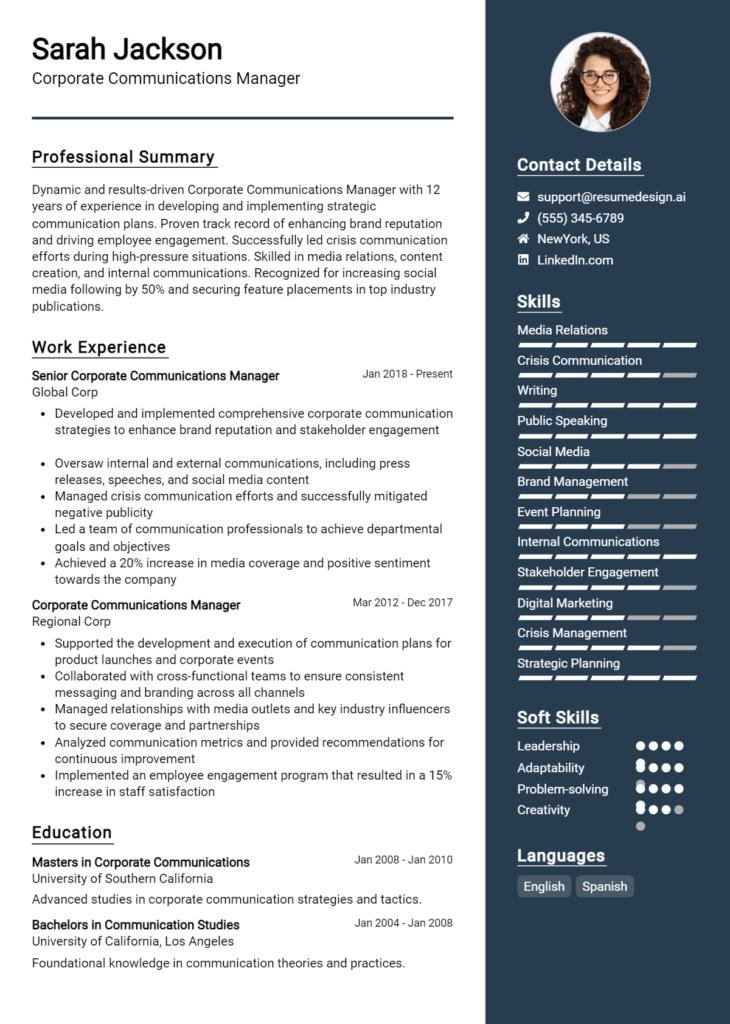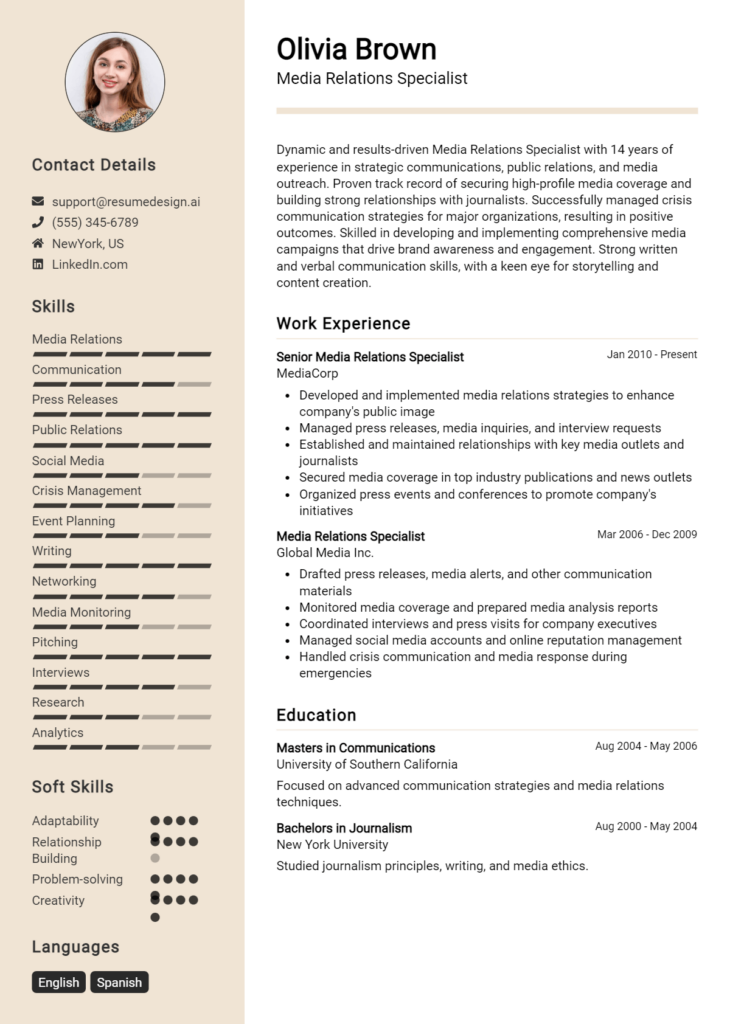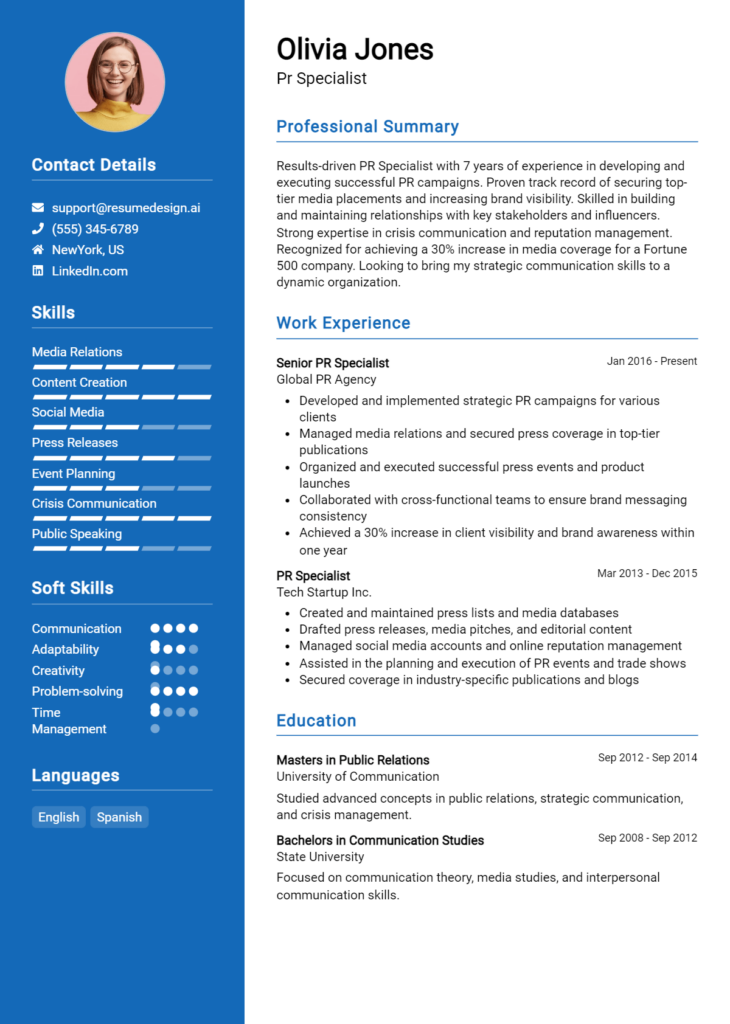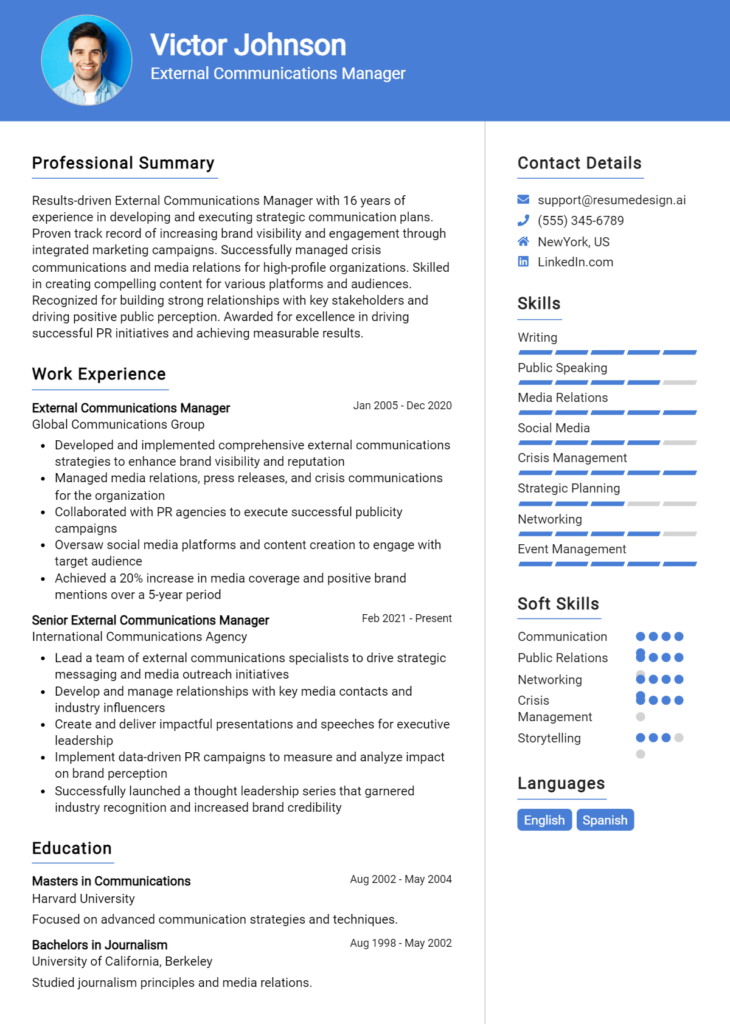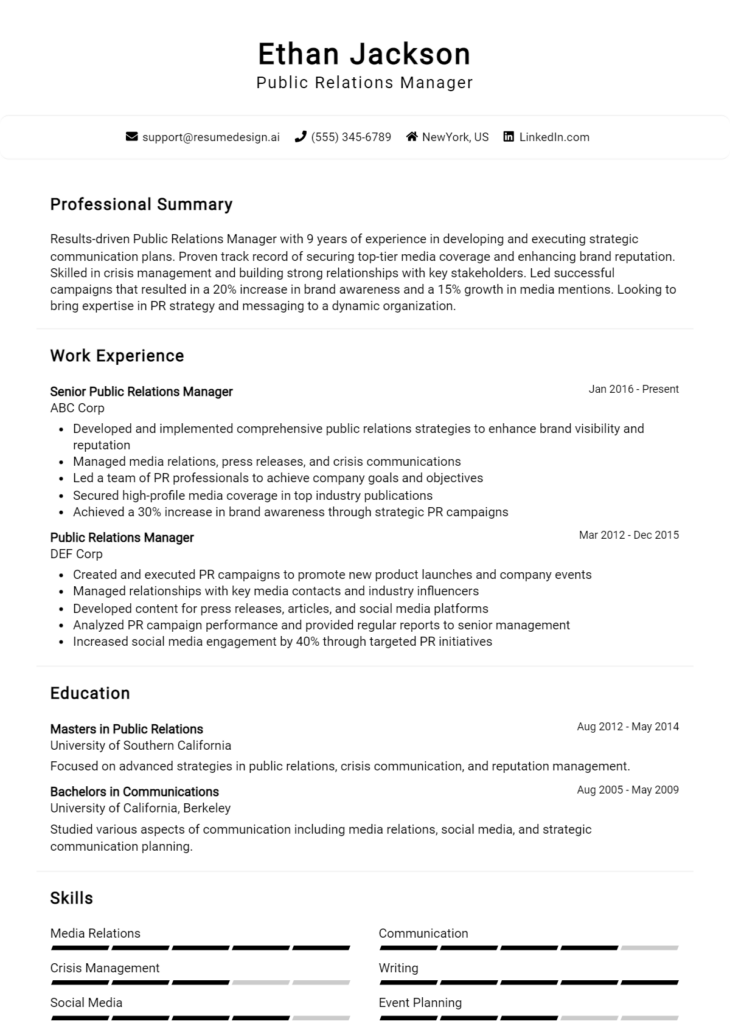Press Officer Core Responsibilities
A Press Officer plays a crucial role in managing communication between an organization and the public, effectively bridging various departments such as marketing, public relations, and management. This professional is responsible for crafting press releases, coordinating media events, and responding to inquiries, requiring strong technical writing, operational awareness, and problem-solving abilities. These skills are vital for advancing the organization’s goals and enhancing its reputation. A well-structured resume can effectively highlight these qualifications, showcasing the candidate's expertise and experience to potential employers.
Common Responsibilities Listed on Press Officer Resume
- Developing and executing media strategies
- Writing and distributing press releases
- Managing media relations and inquiries
- Coordinating press conferences and events
- Monitoring media coverage and public sentiment
- Collaborating with marketing and communications teams
- Preparing briefing materials for executives
- Conducting research on industry trends
- Handling crisis communication
- Building and maintaining a media contact list
- Analyzing and reporting on media metrics
- Creating content for social media platforms
High-Level Resume Tips for Press Officer Professionals
In the competitive field of public relations, a well-crafted resume is essential for Press Officer professionals. This document often serves as the first impression a candidate makes on potential employers, making it crucial to present a compelling narrative that highlights both skills and achievements. A strong resume not only showcases relevant experience but also reflects a candidate's ability to communicate effectively—one of the core competencies for success in this role. In this guide, we will provide practical and actionable resume tips specifically tailored for Press Officer professionals to help you stand out in the job market.
Top Resume Tips for Press Officer Professionals
- Tailor your resume to the job description by incorporating keywords and phrases that align with the specific requirements of the position.
- Showcase relevant experience by prioritizing past roles that highlight your skills in media relations, crisis communication, and public speaking.
- Quantify your achievements by using metrics to demonstrate the impact of your work, such as increased media coverage, audience reach, or successful campaigns.
- Highlight industry-specific skills such as social media management, press release writing, and event coordination that are crucial for a Press Officer role.
- Include a strong summary statement that encapsulates your professional identity, key skills, and career goals in a few impactful sentences.
- Utilize a clean and professional format that enhances readability, making it easy for hiring managers to quickly identify your qualifications.
- Incorporate relevant certifications or training that underscore your expertise in public relations or communications.
- List notable publications or media placements to demonstrate your ability to generate coverage and influence public perception.
- Keep your resume to one or two pages, focusing on the most pertinent information that aligns with the job you are applying for.
By implementing these tips, Press Officer professionals can significantly enhance their resumes, increasing their chances of landing a coveted position in the field. A well-structured resume not only highlights your qualifications but also positions you as a strong candidate capable of navigating the complexities of public relations successfully.
Why Resume Headlines & Titles are Important for Press Officer
The role of a Press Officer is pivotal in shaping and managing an organization's public image and communication strategy. A well-crafted resume headline or title is essential in this competitive field, as it serves as the first point of contact between the candidate and potential employers. A strong headline can immediately grab the attention of hiring managers, offering a succinct summary of the candidate’s key qualifications in just a few impactful words. It should be concise, relevant, and directly related to the job being applied for, setting the tone for the rest of the resume and showcasing the candidate's ability to communicate effectively—an essential skill for any Press Officer.
Best Practices for Crafting Resume Headlines for Press Officer
- Keep it concise: Aim for one powerful phrase that encapsulates your experience.
- Be role-specific: Tailor your headline to reflect the Press Officer position you're applying for.
- Highlight key qualifications: Use impactful words that showcase your strengths and expertise.
- Incorporate industry keywords: Utilize terminology commonly recognized in public relations and communications.
- Showcase achievements: If possible, include notable accomplishments that set you apart.
- Avoid jargon: Use clear language that is easily understood by hiring managers.
- Maintain professionalism: Ensure your headline reflects a professional tone appropriate for the field.
- Reflect your personal brand: Your headline should convey your unique value proposition as a candidate.
Example Resume Headlines for Press Officer
Strong Resume Headlines
Dynamic Press Officer with 5+ Years of Experience in Crisis Communication and Media Relations
Award-Winning Public Relations Specialist Skilled in Strategic Messaging and Brand Management
Results-Driven Communications Expert with Proven Track Record in Enhancing Public Image
Weak Resume Headlines
Press Officer
Experienced Professional Seeking New Opportunities
The strong headlines are effective because they clearly articulate the candidate’s qualifications, highlight relevant experience, and incorporate industry-specific language that resonates with hiring managers. In contrast, the weak headlines fail to impress due to their lack of specificity and engagement; they do not convey any unique characteristics or qualifications that could differentiate the candidate from others, making them less memorable in a pool of applicants.
Writing an Exceptional Press Officer Resume Summary
A resume summary is a crucial component for a Press Officer as it serves as the first impression for hiring managers. An exceptional summary quickly captures attention by succinctly highlighting key skills, relevant experience, and notable accomplishments that align with the role. This brief snapshot should be impactful and tailored to the specific job application, making it easier for employers to recognize a candidate's potential fit for their organization.
Best Practices for Writing a Press Officer Resume Summary
- Quantify Achievements: Use specific numbers and metrics to demonstrate your impact and success in previous roles.
- Focus on Key Skills: Highlight essential skills that are directly relevant to the Press Officer position, such as communication, media relations, and crisis management.
- Tailor the Summary: Customize your summary for each job application to reflect the specific requirements and responsibilities outlined in the job description.
- Be Concise: Aim for 2-4 sentences that convey your qualifications without overwhelming the reader.
- Use Action Verbs: Start sentences with strong action verbs to create a dynamic and engaging tone.
- Highlight Relevant Experience: Mention your most pertinent roles and experiences that showcase your suitability for the Press Officer role.
- Showcase Industry Knowledge: Demonstrate familiarity with the media landscape and trends relevant to the industry you are applying for.
- Maintain a Professional Tone: Ensure that the language used is professional and aligns with the expectations of the role.
Example Press Officer Resume Summaries
Strong Resume Summaries
Dynamic Press Officer with over 5 years of experience in managing high-profile media campaigns, achieving a 30% increase in positive press coverage for major organizational initiatives.
Results-driven communications professional skilled in crisis management and public relations, successfully reducing negative media mentions by 40% through strategic messaging and stakeholder engagement.
Accomplished Press Officer with a proven track record of collaborating with journalists and media outlets, leading to a 50% increase in feature articles for clients in the tech industry.
Weak Resume Summaries
Experienced in public relations and communications, looking for a challenging position in a reputable organization.
Skilled in writing and media relations, with a background in various industries. Aiming to contribute to a team.
The strong resume summaries are considered effective because they provide specific, quantifiable results and demonstrate relevant skills and experiences tied directly to the role of a Press Officer. In contrast, the weak summaries are vague and generic, lacking any measurable achievements or tailored focus, which diminishes their impact and appeal to hiring managers.
Work Experience Section for Press Officer Resume
The work experience section is a critical component of a Press Officer resume, as it provides potential employers with a glimpse into the candidate's practical abilities and achievements in the field. This section showcases technical skills relevant to media relations, communication strategies, and crisis management, while also demonstrating the candidate's capacity to lead teams and produce high-quality results under pressure. By quantifying achievements, such as successful campaigns or media coverage metrics, and aligning their experience with industry standards, candidates can effectively illustrate their value to prospective employers and enhance their chances of securing interviews.
Best Practices for Press Officer Work Experience
- Highlight key technical skills relevant to media relations, such as press release writing, media monitoring, and social media strategy.
- Quantify achievements with specific metrics, like the percentage increase in media coverage or audience engagement.
- Emphasize collaborative projects, showcasing your ability to work with cross-functional teams and stakeholders.
- Use action verbs to describe your responsibilities and contributions, making your experience feel dynamic and impactful.
- Tailor your work experience to align with the job description, addressing the skills and experiences that the employer prioritizes.
- Include notable campaigns or initiatives you led, detailing your role and the positive outcomes achieved.
- Incorporate keywords from the industry to enhance visibility in applicant tracking systems (ATS) and resonate with hiring managers.
- Maintain a clear and concise format, ensuring your achievements are easy to read and understand at a glance.
Example Work Experiences for Press Officer
Strong Experiences
- Developed and executed a media campaign that resulted in a 40% increase in positive press coverage over six months, significantly enhancing the organization’s public image.
- Led a cross-departmental team to launch a crisis communication plan, successfully managing media inquiries and achieving a 90% positive sentiment rating in coverage.
- Coordinated a press event that attracted over 200 attendees, generating more than 15 media placements and reaching an audience of over 1 million through various channels.
- Implemented a new media tracking system that improved response time to media inquiries by 50%, leading to stronger relationships with key journalists and outlets.
Weak Experiences
- Worked on media-related tasks without specific details or outcomes attached to the role.
- Assisted in writing press releases when needed, but did not quantify any impact or results from those releases.
- Participated in team meetings and discussions regarding public relations strategies without highlighting any personal contributions or achievements.
- Helped with social media posts occasionally, but did not track engagement or success metrics.
The examples provided are considered strong because they clearly articulate specific accomplishments, quantify results, and demonstrate leadership and collaboration within teams. In contrast, the weak experiences lack detail and measurable outcomes, making them less impactful and failing to showcase the candidate's true capabilities in the role of a Press Officer.
Education and Certifications Section for Press Officer Resume
The education and certifications section of a Press Officer resume plays a crucial role in showcasing a candidate's academic background and professional qualifications. It not only highlights the formal education that has provided the foundational knowledge for effective communication and public relations but also emphasizes any industry-relevant certifications and continuous learning efforts. By including relevant coursework, certifications, and specialized training, candidates can significantly enhance their credibility and demonstrate their alignment with the job role, positioning themselves as knowledgeable and qualified professionals in the field of public relations and media management.
Best Practices for Press Officer Education and Certifications
- Focus on relevant degrees, such as Communications, Public Relations, Journalism, or Marketing.
- Include industry-recognized certifications from reputable organizations, such as the Public Relations Society of America (PRSA).
- List relevant coursework that directly aligns with the skills required for a Press Officer role.
- Highlight any specialized training programs or workshops attended that are pertinent to media relations.
- Keep the format clear and organized, making it easy for hiring managers to identify key qualifications.
- Update this section regularly to reflect any new educational accomplishments or certifications obtained.
- Include the date of completion for certifications to show currency in knowledge and skills.
- Tailor this section to match the job description, emphasizing qualifications that meet specific employer needs.
Example Education and Certifications for Press Officer
Strong Examples
- Bachelor of Arts in Communications, University of California, 2020
- Certification in Public Relations, Public Relations Society of America (PRSA), 2021
- Advanced Media Relations Training, National Association of Broadcasters, 2022
- Coursework in Crisis Communication and Reputation Management, University of Southern California
Weak Examples
- High School Diploma, Generic High School, 2015
- Certification in Basic Computer Skills, Online Course, 2019
- Bachelor of Science in Biology, University of Texas, 2018
- Outdated Certification in Event Planning, Event Planning Institute, 2016
The strong examples listed are considered relevant and effective because they directly align with the knowledge and skills necessary for a Press Officer position, such as communications, media relations, and crisis management. They showcase recent qualifications and specialized training that are valuable in the industry. In contrast, the weak examples reflect educational qualifications and certifications that do not pertain to the field of public relations, either because they are outdated, irrelevant, or not aligned with the responsibilities of a Press Officer, diminishing the candidate's perceived expertise and suitability for the role.
Top Skills & Keywords for Press Officer Resume
As a Press Officer, your ability to effectively communicate and manage public relations is paramount. The right skills not only enhance your resume but also demonstrate your capability to navigate the fast-paced world of media and public engagement. A well-crafted resume should highlight both hard and soft skills that are essential for the role, showcasing your proficiency in managing press releases, crafting compelling narratives, and building relationships with journalists and stakeholders. By focusing on these skills, you can present yourself as a valuable asset to any organization looking to maintain a positive public image.
Top Hard & Soft Skills for Press Officer
Soft Skills
- Excellent verbal and written communication
- Strong interpersonal skills
- Ability to work under pressure
- Critical thinking and problem-solving
- Adaptability and flexibility
- Attention to detail
- Team collaboration
- Creativity in storytelling
- Time management
- Conflict resolution
Hard Skills
- Media relations expertise
- Proficient in digital marketing tools
- Knowledge of social media platforms
- Press release writing and editing
- Crisis communication strategies
- Data analysis and reporting
- Event planning and coordination
- Familiarity with public relations software
- Understanding of SEO principles
- Research and fact-checking skills
By integrating these essential skills into your resume, you can effectively demonstrate your qualifications for the Press Officer role. Additionally, showcasing relevant work experience can further reinforce your expertise and readiness to excel in this dynamic field.
Stand Out with a Winning Press Officer Cover Letter
Dear [Hiring Manager's Name],
I am writing to express my interest in the Press Officer position at [Company Name] as advertised on [where you found the job listing]. With a robust background in public relations and a proven track record of managing media relations effectively, I am confident in my ability to enhance your organization's visibility and reputation through strategic communication and innovative storytelling. My experience working with diverse stakeholders has equipped me with the skills necessary to craft compelling narratives that resonate with both the media and the public.
In my previous role at [Previous Company Name], I successfully developed and implemented press strategies that increased media coverage by over 40% within a year. By cultivating strong relationships with journalists and leveraging social media platforms, I ensured that our key messages reached target audiences effectively. I possess extensive experience in writing press releases, organizing press events, and responding to media inquiries, which I believe aligns well with the expectations for the Press Officer role at [Company Name].
I am particularly drawn to this position at [Company Name] because of your commitment to [specific value or mission of the company]. I admire your recent initiatives in [mention any relevant project or campaign], and I am excited about the opportunity to contribute to such impactful work. I am eager to bring my passion for storytelling and my proactive approach to media engagement to your team, ensuring that [Company Name] continues to shine in the spotlight.
Thank you for considering my application. I look forward to the possibility of discussing how my skills and experiences align with the goals of [Company Name]. I am enthusiastic about the opportunity to contribute to your organization as a Press Officer and help shape the narrative that showcases your achievements and innovations.
Sincerely,
[Your Name]
[Your Contact Information]
Common Mistakes to Avoid in a Press Officer Resume
When crafting a resume for a Press Officer position, it’s essential to present your skills and experiences effectively. However, many candidates make common mistakes that can hinder their chances of landing an interview. Avoiding these pitfalls will help ensure your resume stands out in a competitive job market. Here are some common mistakes to be aware of:
Vague Job Descriptions: Failing to provide specific details about previous roles can leave hiring managers unsure of your actual responsibilities and achievements. Use quantifiable metrics where possible.
Inconsistent Formatting: A cluttered or inconsistent format can distract from your content. Ensure uniformity in font styles, sizes, and bullet points to enhance readability.
Overloading with Jargon: While industry-specific terminology can demonstrate expertise, excessive jargon can alienate readers. Aim for clarity and ensure that your skills and experiences are understandable to a broader audience.
Neglecting Tailoring: Submitting a generic resume for a Press Officer position can signal a lack of interest. Tailor your resume to highlight relevant skills and experiences that align with the specific job description.
Ignoring Keywords: Many companies use Applicant Tracking Systems (ATS) to filter resumes. Failing to include relevant keywords from the job posting can result in your resume being overlooked.
Lack of Accomplishments: Simply listing duties performed in previous roles does not showcase your impact. Highlight accomplishments and contributions that demonstrate your effectiveness as a Press Officer.
Inadequate Proofreading: Spelling and grammatical errors can undermine your professionalism. Always proofread your resume multiple times or have someone else review it to catch any mistakes.
Excessive Length: A resume that is too long can overwhelm hiring managers. Aim for a concise document that effectively summarizes your qualifications, ideally keeping it to one or two pages.
Conclusion
As a Press Officer, your role is pivotal in shaping and communicating your organization’s message to the public and the media. Key responsibilities typically include crafting press releases, coordinating media events, managing public relations campaigns, and maintaining relationships with journalists. Strong writing skills, an understanding of media dynamics, and the ability to think strategically are essential attributes for success in this position.
In addition to these skills, it is crucial to tailor your resume to highlight relevant experiences and accomplishments that align with the expectations of the job. This could involve showcasing your ability to manage high-pressure situations, your proficiency in crafting compelling narratives, and any measurable successes related to previous media campaigns.
Now is the perfect time to review and refine your Press Officer resume. Take advantage of the resources available to you, such as resume templates, which can help you structure your information effectively. You can also utilize a resume builder to create a polished and professional document with ease. For inspiration, check out resume examples tailored specifically for Press Officers and similar roles. Additionally, don't forget to enhance your application with a strong introduction by using our cover letter templates.
Take action today and ensure your resume stands out in the competitive field of public relations!

